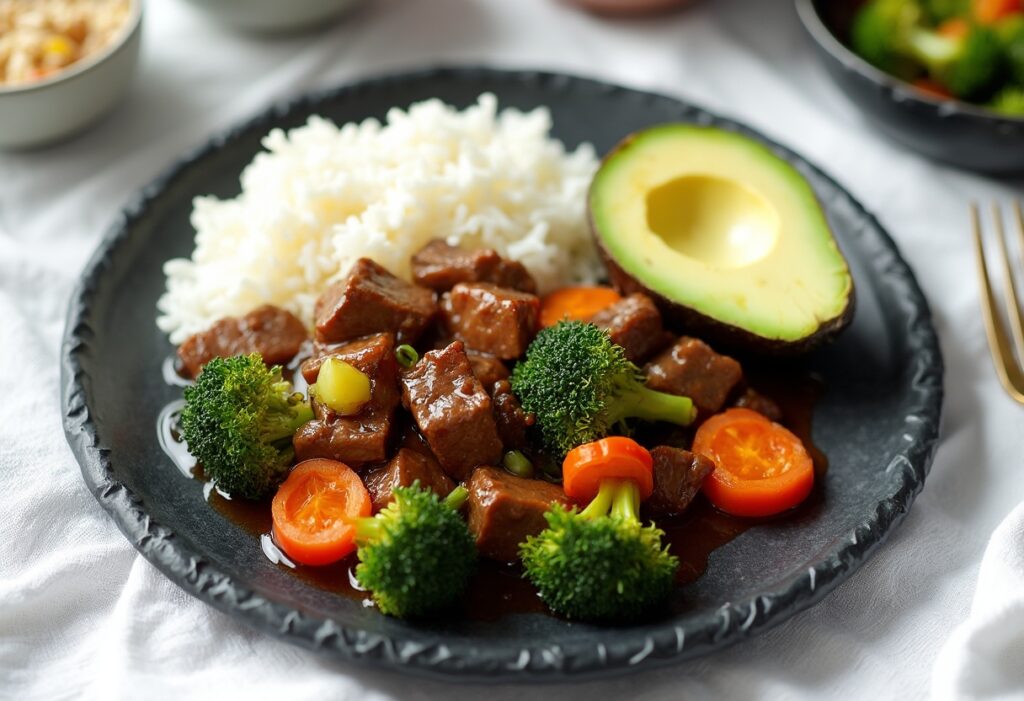Strategies for lean mass growth
Gaining muscle while losing fat is a topic that sparks much debate in the fitness world. Many wonder if it’s possible to achieve both goals at once. While it may seem contradictory, we can work towards these aims over time with the right approach.
Our bodies naturally build muscle or burn fat, not both at once. However, with careful planning, we can shift between these processes to see improvements in both areas. It takes patience and precision, but the results can be worth it. We’ll explore some strategies to help balance muscle gain and fat loss effectively.
Key Takeaways
- Gaining muscle and losing fat simultaneously is challenging but achievable over time.
- Proper diet, exercise, and nutrient timing are crucial for success
- Balancing anabolic and catabolic states is key to seeing progress in both areas

4 of the most effective ways to gain muscle and diminish body fat – at the same time
One: Eat More Protein
We recommend increasing your protein intake. This helps build new muscle and prevents muscle breakdown. Aim for protein-rich foods at every meal to keep your muscles growing.
Two: Time Your Nutrients Carefully
Planning your meals is key. Each meal should have the right mix of nutrients. We suggest:
- Lean proteins (chicken, fish, tofu)
- Complex carbs (brown rice, quinoa)
- Healthy fats (avocado, nuts)
Avoid foods like sugary snacks or processed items that might slow your progress.

Three: Try Short, Intense Workouts
Quick, high-intensity exercises can be very effective. They boost fat-burning even after you’re done working out. These workouts also help keep your muscles while reducing fat. We advise keeping these sessions to 20 minutes or less.
Four: Push Yourself with Weights
Focus on challenging weight training sessions. This approach is better for changing your body than long cardio workouts. When we lift weights, we build muscle and burn fat simultaneously.
Here’s a simple weekly plan to try:
| Day | Activity |
|---|---|
| Mon | Upper body weights |
| Tue | 15-min high-intensity workout |
| Wed | Lower body weights |
| Thu | Rest |
| Fri | Full body weights |
| Sat | 20-min high-intensity workout |
| Sun | Rest |
Remember, everyone is different. You might need to adjust this plan to fit your needs. Keep trying new things until you find what works best for you.
Common Questions About Muscle Gain on Low-Calorie Diets
Can you add muscle while eating less?
Yes, building muscle on a calorie-restricted diet is possible if you consume enough protein. This process is called body recomposition. It’s more challenging than building muscle in a calorie surplus, but it can be done with the right approach.
Key factors:
- Eat adequate protein
- Do resistance training
- Get enough sleep
- Be patient – results take time
How much protein do you need for muscle growth when cutting calories?
When trying to gain muscle on a calorie deficit, we recommend consuming 1.6-2.2 grams of protein per kilogram of body weight daily. For example, a 70 kg person would aim for 112-154 grams of protein daily.
Good protein sources:
- Lean meats
- Fish
- Eggs
- Greek yogurt
- Beans and lentils
Can you see muscle gains while losing fat?
It’s possible to notice signs of muscle growth while losing fat on a low-calorie diet. This may include:
- Increased strength in your lifts
- Better muscle definition as body fat decreases
- Clothes fit differently in certain areas
- Slight weight gain or maintenance despite losing inches
Remember, visible changes can take weeks or months to appear.
What helps keep muscle when eating less?
To maintain muscle mass on a calorie deficit:
- Keep protein intake high
- Continue resistance training
- Reduce calories gradually, not drastically
- Get enough sleep (7-9 hours nightly)
- Manage stress levels
- Consider taking a multivitamin
Calorie restriction combined with exercise can be effective for preserving muscle while losing fat.
How does meal timing affect muscle building?
Time-restricted feeding, like intermittent fasting, can impact muscle growth efforts. Some potential effects:
- May increase fat-burning
- Can make it harder to eat enough protein
- Might affect workout performance if not timed well
If you are using this approach, we suggest timing meals around workouts. Eat protein-rich meals before and after training to support muscle growth.
What’s a good way to figure out calorie needs for muscle gain?
To calculate a calorie deficit that allows for muscle gain:
- Find your maintenance calories (use an online calculator or track intake for a week)
- Reduce by 10-20% for a moderate deficit
- Adjust based on results every 2-4 weeks
Example calculation: Maintenance calories: 2500 20% deficit: 2500 x 0.8 = 2000 calories per day
Monitor weight, measurements, and progress photos to fine-tune your approach.
Download your low-carb, high-protein dinner recipe book with two bonuses here.
I appreciate your support.
Feel free to visit my website at www.angedim.com/recipes for healthy recipes to help heal your body.
You can also visit my YouTube Channel for more recipes & health advice here: https://bit.ly/4aN7m1p
